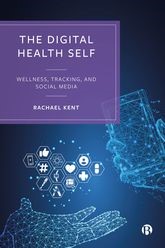 The Digital Health Self: Wellness, Tracking and Social Media
The Digital Health Self: Wellness, Tracking and Social Media
Contents
-
-
-
-
-
From self-quantification to self-tracking From self-quantification to self-tracking
-
From self-tracking to the datafication of health From self-tracking to the datafication of health
-
Surveillance cultures of the digital health self Surveillance cultures of the digital health self
-
From the datafication of health to digital phenotyping From the datafication of health to digital phenotyping
-
The choice architecture of coercive self-tracking technologies The choice architecture of coercive self-tracking technologies
-
Gamification and ‘nudging’ the digital health self Gamification and ‘nudging’ the digital health self
-
Quantifying narratives of the digital healthy self Quantifying narratives of the digital healthy self
-
‘Likes’ as currency ‘Likes’ as currency
-
A ‘like’ for a ‘like’! A ‘like’ for a ‘like’!
-
-
Conclusions Conclusions
-
-
-
-
-
-
-
-
2 Understanding Our Bodies through Datafication
Get access-
Published:May 2023
Cite
Abstract
Through different technological, practical and economic shifts, from the self-quantification movement to consumer self-tracking to the increasing everyday datafication of health and digital phenotyping, this chapter traces how data collection, mining and sharing have become an integral part of health management and self-care for users, citizens and patients under digital capitalism. Through behavioural economic theories of choice architecture and nudge theory, the chapter argues for the need to pay ethical attention to the persuasive and coercive design within self-tracking and digital health technologies. It analyses the impact of health gamification and what it means when we understand our health, body and identity through data, current debates in new materialism and the political economy of the datafication of health. The chapter concludes by considering the ongoing and long-term assemblage of humans with the reductive patterns of datafication and how these processes can promote the regulation and agential (re)organisation of bodily experience of the digital health self through everyday reductive processes of datafication.
Sign in
Personal account
- Sign in with email/username & password
- Get email alerts
- Save searches
- Purchase content
- Activate your purchase/trial code
- Add your ORCID iD
Purchase
Our books are available by subscription or purchase to libraries and institutions.
Purchasing information| Month: | Total Views: |
|---|---|
| February 2024 | 1 |
| March 2024 | 1 |
| August 2024 | 1 |


Get help with access
Institutional access
Access to content on Oxford Academic is often provided through institutional subscriptions and purchases. If you are a member of an institution with an active account, you may be able to access content in one of the following ways:
IP based access
Typically, access is provided across an institutional network to a range of IP addresses. This authentication occurs automatically, and it is not possible to sign out of an IP authenticated account.
Sign in through your institution
Choose this option to get remote access when outside your institution. Shibboleth/Open Athens technology is used to provide single sign-on between your institution’s website and Oxford Academic.
If your institution is not listed or you cannot sign in to your institution’s website, please contact your librarian or administrator.
Sign in with a library card
Enter your library card number to sign in. If you cannot sign in, please contact your librarian.
Society Members
Society member access to a journal is achieved in one of the following ways:
Sign in through society site
Many societies offer single sign-on between the society website and Oxford Academic. If you see ‘Sign in through society site’ in the sign in pane within a journal:
If you do not have a society account or have forgotten your username or password, please contact your society.
Sign in using a personal account
Some societies use Oxford Academic personal accounts to provide access to their members. See below.
Personal account
A personal account can be used to get email alerts, save searches, purchase content, and activate subscriptions.
Some societies use Oxford Academic personal accounts to provide access to their members.
Viewing your signed in accounts
Click the account icon in the top right to:
Signed in but can't access content
Oxford Academic is home to a wide variety of products. The institutional subscription may not cover the content that you are trying to access. If you believe you should have access to that content, please contact your librarian.
Institutional account management
For librarians and administrators, your personal account also provides access to institutional account management. Here you will find options to view and activate subscriptions, manage institutional settings and access options, access usage statistics, and more.